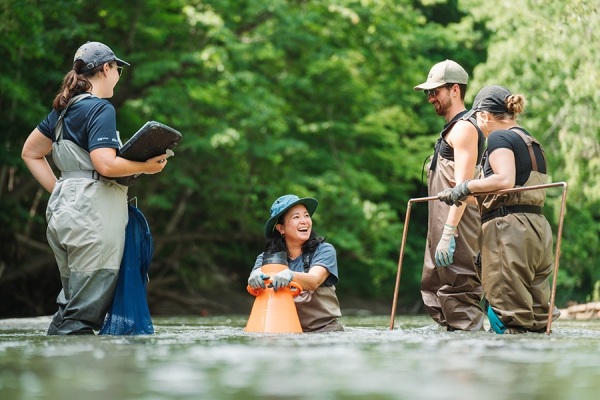 Assistant professor and GLIER researcher Catherine Febria conducts work with partners in the Sydenham River near Chatham-Kent.
Assistant professor and GLIER researcher Catherine Febria conducts work with partners in the Sydenham River near Chatham-Kent.
A group of researchers is exploring the question of how to conduct their work “in a good way,” recognizing the harm Indigenous Peoples around the world have faced in the name of science — and it starts with truth.
Assistant professor and GLIER researcher Catherine Febria collaborated on a paper published in Nature Ecology and Evolution with principal investigator Andrea Reid of the UBC Centre for Indigenous Fisheries, York University professor Deborah McGregor, Allyson Menzies, Lauren Eckert, and Jesse Pop highlighting four elements for conducting ecological research in a good way – a term used to honour Indigenous rights, culture, and spirit.
“I’m hoping this work is part of a broader conversation on being responsible in the research that we pursue, and how can we make sure, especially in Canada, we do that in a way that’s rooted in treaty, partnership, and not power,” Dr. Febria said of the paper, “Ecological research ‘in a good way’ means ethical and equitable relationships with Indigenous Peoples and Lands.”
One of the four elements outlined is “Recognize that reconciliation can only come after truth,” reminding ecologists that they hold a responsibility to learn about historical and ongoing injustices, especially when it comes to the People, Lands, and Waters affected by their research.
“For me, a water researcher, it’s important to understand the local context of my work and also redefine research excellence alongside leading Indigenous scholars and my co-authors,” Febria said. “Before we researchers rush to include any Indigenous community or rush toward reconciliation, we need to take the time to move upstream and connect with understanding the truth that Indigenous knowledge is connected to People and connected to Land and Water and how those bonds have been broken.
“Those of us who have been doing this kind of work for some time, myself included, are still unlearning and understanding the depth and complexity of good relations.”
Other key elements include “know that there is no view from nowhere” explaining that no one is “un-situated” in their work and recognizing how a researcher’s values and biases shape what they choose to study, methods to use, and how they interpret data and frame results. Another element is to “Establish free, prior and informed consent,” going beyond a simple ‘yes’ or ‘no’ to develop relationships, and “learn with and from Indigenous Peoples and land.”
“We know that science is one piece of society and will inform solutions for our environment,” Febria said. “One of the key elements of working in a good way is being more relational. And that’s been a huge cultural change for science and it is already redefining research excellence.”
Febria said it’s important to recognize everything — including non-human beings like plants and animals — is connected. Standing with her co-authors, she believes partnership and collaboration are useful, and require greater support and recognition as essential to science.
“Echoing my colleagues in this work, I’m hoping to show through example that this is what it could be like here at UWindsor and that it’s connected to a growing shift in science and research culture,” she said. “We are just getting started, we have still more to do.”
